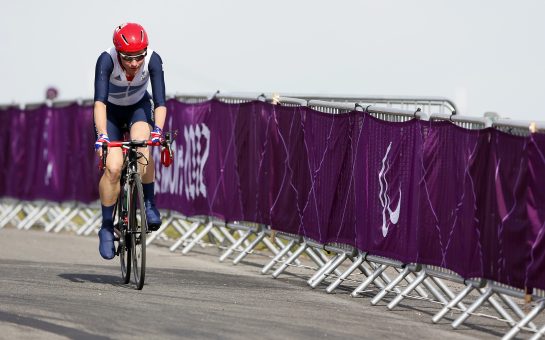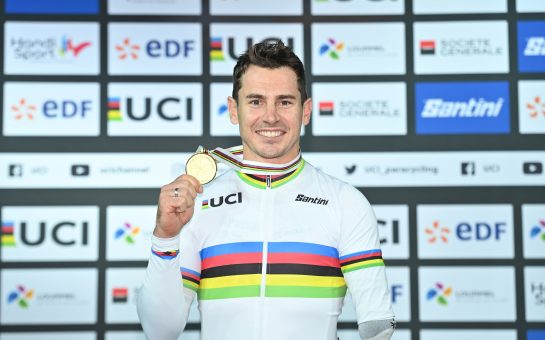British cycling is in need of love and affection again, the kind of unwavering support that in recent times has elevated the sport way beyond anything ever seen on these shores.
Curious fans will flock in their droves to the Bike & Triathlon Show this weekend at Manchester Central to catch a glimpse of six-times Olympic gold medallist Sir Chris Hoy, double world champion in Colombia last week Joanna Rowsell and 1992 Barcelona Games individual pursuit winner Chris Boardman.
The interest is there in the sport, but at the very top the right balance needs to be found again.
At the 2014 World Track Cycling World Championships in Colombia, Britain won five medals however all of those medals were won by women, with the men failing to win a medal for the first time since 1998.
This led to Boardman questioning whether Sir Dave Brailsford should focus on his role as performance director for British Cycling, rather than dividing his time between that position and Team Sky principal.
This week Dr Steve Peters was recruited by Roy Hodgson to assist in England’s World Cup preparations.
While Peters has previously been able to work successfully with British cyclists and others – such as Liverpool FC and snooker player Ronnie O’Sullivan – Brailsford’s division of time appears more problematic.
Brailsford became British performance director in 2003, accelerating Britain to the top of track cycling’s pecking order.
The team’s zenith came at the 2008 Beijing Olympics, winning 12 medals, seven of those gold.
Since then, cycling has gained a much greater profile on these shores, with the Tour of Britain – revived in 2004 – attracting many of road cycling’s elite (Sir Bradley Wiggins and Mark Cavendish were among those to have taken part in 2013) and increased media coverage.
Most notably, Team Sky have won the Tour de France twice in their first four seasons, Brailsford bringing his charisma and will to win from the track to the road.
Since Team Sky’s creation in 2009, Britain have performed reasonably consistently on the track: they won nine medals at each of the 2010, 2011 and 2013 World Championships and a highly impressive 13 at the 2012 World Championships in Melbourne.
Ballerup 2010: Nine medals; Men 4 (2 gold), Women 5 (1 gold)
Apeldoorn 2011: Nine medals; Men 5 (1 gold), Women 4 (1 gold)
Melbourne 2012: 13 medals; Men 8 (3 gold), Women 5 (3 gold)
London 2012: Nine medals; Men 5 (4 gold), Women 4 (3 gold)
Minsk 2013: Nine medals – Men 3 (2 gold), Women 6 (3 gold)
Cali 2014: Five medals; Men 0, Women 5 (2 gold)
That success in Melbourne was carried into the London 2012 Olympics, bringing nine medals, seven of them gold.
However, even before this year’s World Championships, Brailsford admitted to The Telegraph that he is considering reviewing his position.
In his book Inside Team Sky, David Walsh describes how Brailsford, the team’s figurehead, would often nap during Tour de France stages, trusting his lieutenants to keep things ticking over, but he was the man everyone looked to when the team encountered its toughest challenges.
It is the figurehead role which is key here: Brailsford saw Britain’s cycling potential on the track, inspired it to glory and then expanded that success out onto the road with Team Sky, a set-up he initiated.
While British women continue to excel in the velodrome – Rowsell, Laura Trott and Becky James picking up where Victoria Pendleton and Wendy Houvenaghel left off – the next generation of men’s track cyclists are not stepping up to the mark.
The latest World Championships have only further highlighted the trend: only three of the nine medals won in Minsk in 2013 were won by men, down from five in 2011 and eight in 2012.
The men who delivered multiple medals for Britain in previous World Championships have either retired (Hoy) or moved to road cycling (Wiggins).
Wiggins is not alone: Peter Kennaugh, Ian Stannard, Ben Swift and Geraint Thomas all made their name on the track before swapping velodromes for mountains.
In short, Britain’s success in the Tour de France and road cycling events appears to have come at the expense of dominance on the track.
Brailsford is not merely a symbol of British cycling’s shift from track to road, but a key reason behind it.
He might leave the coaching, psychiatry, nutrition and the other elements which make up a team’s performance, but he is the glue which holds it all together and sustains it when others start to panic.
As interest and participation in road cycling continues to expand in Britain, it may be that a separate figurehead is required to reinvigorate track cycling, with not even a man of Brailsford’s genius able to get the best out of both disciplines.
Image/video courtesy of Welcome to Yorkshire via YouTube/British Cycling, with thanks.

